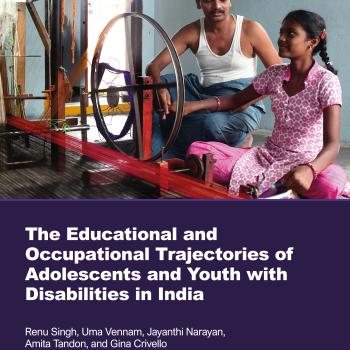
This report summarises findings from a study to address a gap in relation to data on the educational and occupational trajectories of adolescents and young people living with disabilty in India. The research brought together analysis of Young Lives longitudinal study data collected since 2001 with findings from an in-depth qualitative study conducted by Young Lives India in Andhra Pradesh and Telangana in November-December 2020, during the COVID-19 pandemic. The study findings were discussed with a research advisory group to address policy gaps and develop policy recommendations to enhance the quality of life of persons with disabilities.
Specifiallly, the report draws upon panel data from five rounds of Young Lives longitudinal survey (2001- 2016) to analyse the self-assessed educational and occupational outcomes of 100 young persons with disabilities (a Younger Cohort age 15 and an Older Cohort age 22 in 2016) and on a subsequent qualitative sub-study conducted with a nested sample of 34 young persons with disabilities and their caregivers, when they were age 18 (Younger Cohort) and 25 (Older Cohort).
The study explores the facilitators and barriers that adolescents and youth with disabilities face in their educational trajectories, and their related transitions to the labour market, marriage and family formation. It also captures the effects of the COVID-19 lockdown on their lives and aspirations for the future.
This report is accompanied by a Research Brief, summarising the key findings, and a Policy Brief, with recommendations on the findings for policy makers.

This report summarises findings from a study to address a gap in relation to data on the educational and occupational trajectories of adolescents and young people living with disabilty in India. The research brought together analysis of Young Lives longitudinal study data collected since 2001 with findings from an in-depth qualitative study conducted by Young Lives India in Andhra Pradesh and Telangana in November-December 2020, during the COVID-19 pandemic. The study findings were discussed with a research advisory group to address policy gaps and develop policy recommendations to enhance the quality of life of persons with disabilities.
Specifiallly, the report draws upon panel data from five rounds of Young Lives longitudinal survey (2001- 2016) to analyse the self-assessed educational and occupational outcomes of 100 young persons with disabilities (a Younger Cohort age 15 and an Older Cohort age 22 in 2016) and on a subsequent qualitative sub-study conducted with a nested sample of 34 young persons with disabilities and their caregivers, when they were age 18 (Younger Cohort) and 25 (Older Cohort).
The study explores the facilitators and barriers that adolescents and youth with disabilities face in their educational trajectories, and their related transitions to the labour market, marriage and family formation. It also captures the effects of the COVID-19 lockdown on their lives and aspirations for the future.
This report is accompanied by a Research Brief, summarising the key findings, and a Policy Brief, with recommendations on the findings for policy makers.

